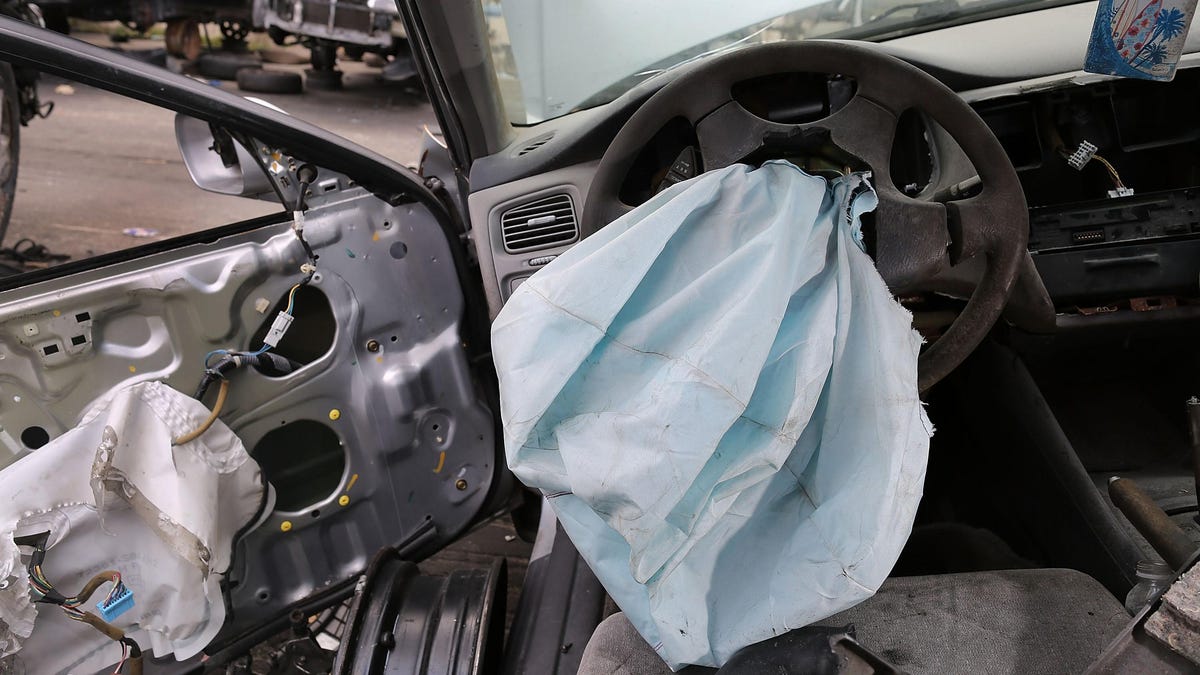Those infamous Takata airbags—the ones with the accelerator that can send shrapnel flying towards the faces of folks sitting in the front of them—are still a massive problem on U.S. roads. Worse yet, some of the most humid and therefore dangerous states are home to nearly half of all unfixed vehicles
Just as a refresher: a decade ago, the National Highway Traffic Safety Administration issued a recall for a staggering 67 million vehicles due to faulty airbag inflators. When the recall was first issued, authorities realized that there was no way to replace that many airbags in a timely fashion. Manufacturing wise, and time wise, it made no sense. So in the last ten years, the airbags have continued to kill. In 2022, at least five people died due to the faulty airbags. NHTSA says at least 27 Americans have been killed, though the problem is worldwide. New data from CarFax shows just how widespread the problem continues to be in the U.S.:
Ten years after the National Highway Traffic Safety Administration (NHTSA) mandated the recall of Takata airbags nationwide because of the risk they pose for bodily harm – or even death – to occupants, more than 6.4 million vehicles in the U.S. still have those airbags, according to CARFAX data.
More than 2.5 million – roughly 40% of all these unfixed vehicles – are located in states that NHTSA calls Zone A. These states “pose the highest threat to safety” because of their high heat and humidity. They are Alabama, California, Florida, Georgia, Hawaii, Louisiana, Mississippi, South Carolina and Texas.
States with some of the highest concentrations of Takata airbags—like Texas and California—also happen to be places where the bags are most at risk of causing injuries thanks to the airbag’s fatal flaw, from Consumer Reports:
At the heart of the problem is the airbag’s inflator, a metal cartridge loaded with propellant wafers, which in some cases has ignited with explosive force. If the inflator housing ruptures in a crash, metal shards from the airbag can be sprayed throughout the passenger cabin—a potentially disastrous outcome from a supposedly lifesaving device.
NHTSA has determined the root cause of the problem: airbags that use ammonium-nitrate-based propellant without a chemical drying agent. As postulated early on, environmental moisture, high temperatures, and age as associated with the defect that can improperly inflate the airbags and even send shrapnel into the occupant.
If you’re vehicle is affected by a Takata airbag recall you’ve likely already been contacted in some way, but it can be harder if you have bought a used vehicle in the last 10 years to know for sure. Nineteen automaker participate in the recall, however some vehicles are more at risk of fatal airbag deployment than others. NHTSA issued a Do Not Drive order on these vehicles:
Acura
- 2002-2003 Acura 3.2 TL
- 2003 Acura 3.2 CL
BMW
- Certain 2000-2006 BMW 3 Series (E46) including M3 models
- Certain 2000-2003 BMW 5 Series (E39) including M5 models
- Certain 2000-2004 BMW X5s (E53) models
Chrysler
Dodge
- 2005-2010 Dodge Magnum
- 2005-2010 Dodge Charger
- 2005-2010 Dodge Challenger
- 2003 Dodge Ram 1500
Ford
- Certain 2006 Ford Ranger models
Honda
- 2001-2002 Honda Accord
- 2001-2002 Honda Civic
- 2002 Honda CR-V
- 2002 Honda Odyssey
- 2003 Honda Pilot
Mazda
- Certain 2006 Mazda B-Series models
You can always enter your VIN in NHTSA’s “Open Recall” tool to double check if your vehicle is under a recall, including the Takata airbag recall. Such airbags (and any other repairs) should be repaired for free by your local dealership, but there may be a long wait time for parts. Ford issued a recall of its recall earlier this year to double checking some sloppy handwork done in order to fix recalled Takata airbags on nearly 250,000 vehicles.







